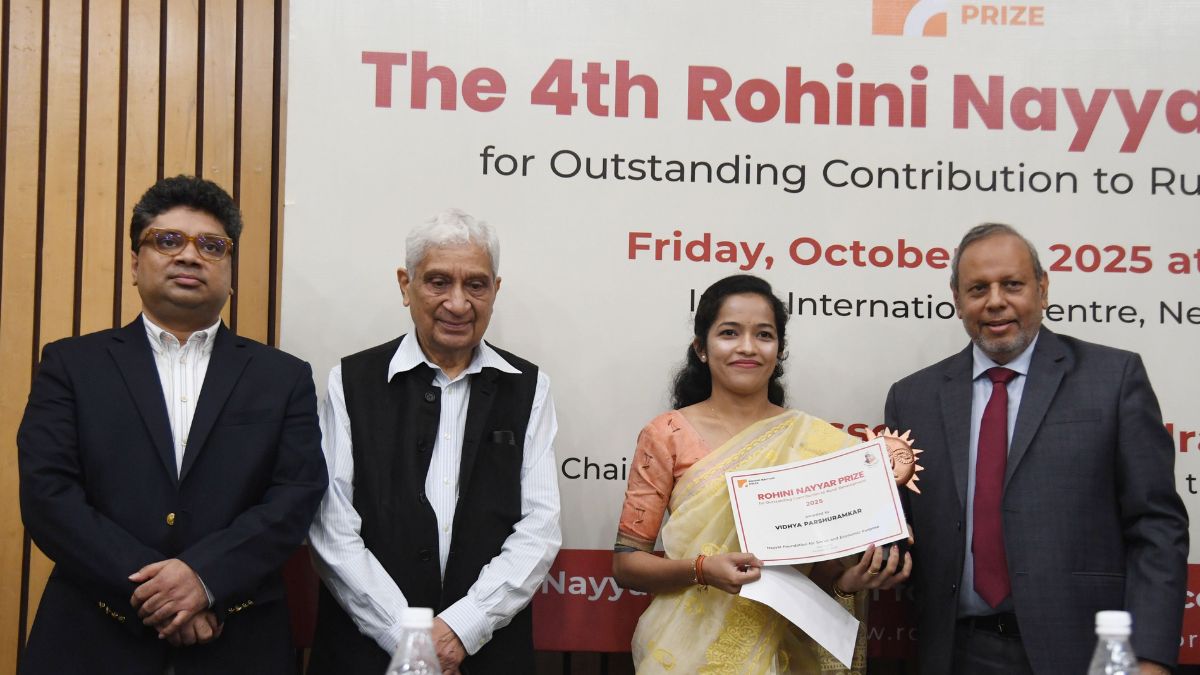Sustainable nutrition innovator Vidhya Parshuramkar wins Rohini Nayyar Prize 2025
 Vidhya Parshuramkar, with the Rohini Nayyar Prize 2025 | Kritajna Naik
Vidhya Parshuramkar, with the Rohini Nayyar Prize 2025 | Kritajna Naik
Vidhya Parshuramkar, daughter of a farmer from Maharashtra, has been awarded the prestigious Rohini Nayyar Prize 2025 for her pioneering work in tackling anaemia and malnutrition through her enterprise, Nutri Dabba. The award, instituted in memory of economist and rural development expert Dr Rohini Nayyar, celebrates young changemakers under 40 who are driving social transformation in rural India.
Vidhya, 24, developed Hydro-NIR technology, an innovative method that naturally extends the shelf life of pearl millet flour to six months without preservatives or nutritional loss. This breakthrough became the foundation of Millets Now, enabling the creation of value-added millet products for a broader market.
The annual award, carrying a prize of Rs 10 lakh, honours the legacy of Dr Nayyar, whose life and work were dedicated to improving the well-being of rural communities, especially women and children. She was instrumental in conceptualising India’s Human Development Report and was a key advocate for multidimensional poverty assessment, inclusive growth, and strengthening of panchayati raj institutions.
Delivering the keynote at the ceremony, Prof. Mahendra Dev, a noted economist and member of the Prime Minister’s Advisory Council, reflected on Nayyar’s impact on India’s development landscape. “Rohini’s work highlighted the multidimensional nature of poverty—income, health, education, and dignity. She was deeply involved in the launch of MGNREGA and in strengthening self-help groups, panchayati raj, and anganwadi systems,” he said. “She believed technology must empower rural communities.”
Dr Deepak Nayyar, renowned economist and husband of the late Dr Nayyar, recalled her as someone for whom “the development of rural India was both passion and mission.” He added, “Rohini was devoted to human development—she studied poverty in all its dimensions and worked tirelessly for the well-being of people. She loved art, and her saree collection reflected the colours and textures of India she so deeply cherished.”
Sita Prabhu, who collaborated with Nayyar on several state human development reports, remembered her as a “gentle colossus.” “Rohini was gentle yet firm. Many women today apply for this award because it reflects her spirit—nurturing, inclusive, and empowering,” she said.
This year’s winner, Vidhya, embodies those very values. Her initiative, Nutri Dabba, has developed seven innovative millet-based products to combat anaemia among children and women. The project integrates nutrition with women’s empowerment—local women manufacture the dabbas themselves, ensuring self-reliance and sustainable income.
“For me, nutrition is more than food—it’s about dignity and opportunity,” Vidhya said after receiving the award. “Children’s futures depend on good food. A nation is built by strong people. We train rural women to be self-sufficient and have so far reached over four lakh school-going children. We’re now expanding to South Asian countries facing malnutrition.”
Her model has already transformed mid-day meal programmes in several Maharashtra schools, improving children’s weight and energy levels.
In recognising Vidhya’s work, the Rohini Nayyar Prize continues to affirm the belief that young innovators can transform rural India from within. It also serves as a reminder of Dr Nayyar’s enduring vision of a nation where development is measured not just by growth, but by the well-being, dignity, and empowerment of its people.
India